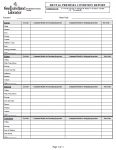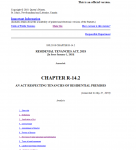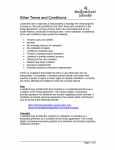When you’re looking for a place to rent it’s important to know some information first, to help narrow down your search. You should take into consideration things like:
- What is the most you can afford to pay for rent?
- Is the area close to school or work?
- Do you need a pet-friendly rental unit?
- Would you live in a building that permits smoking inside?
- Are you willing to sign a fixed-term rental agreement, such as a year-long lease?
When you find a rental unit that you believe may be suitable you should arrange for a viewing. Note the condition of the rental unit during the viewing:
- Has the rental unit been well maintained?
- Are there any issues that require maintenance or repairs?
- Is the rental unit clean?
- Do the appliances work?
It is also important to find out what services are included with the rental unit. Some things that should be considered are:
- Does the rental unit include a washer and dryer?
- Is the cost of utilities included in the rent?
- Who is responsible for lawn care and snow clearing?
- Is parking included with the rental unit? If so, for how many vehicles?
If the rental unit is suitable, and you plan to rent it, it is important to know:
- How much is the rent and when is it due?
- Can you afford to pay rent on time each month?
- How does the landlord want rent to be paid? (Cheque, e-mail money transfer, etc.)
- What kind of rental agreement is it? Is it weekly, monthly or a term from 6 months to a year?
- How much notice is required if you want to move out?
- What is the earliest move-in date and at what exact time?
Some landlords will require you to complete an application to determine your suitability to rent. This helps landlords minimize risk. The application process can include things like a credit check, reference checks, Letters of Conduct from the police, etc.
Before entering into a rental agreement, it is very important to make sure the rental unit is what you are looking for and is suitable. You should read a written rental agreement over carefully before signing it. Once you agree to the terms and conditions of a rental agreement there is no way to back out. A rental agreement is a binding legal contract. More information can be found in our Help Topic about Rental Agreements.
Most landlords require a tenant to pay a security deposit prior to taking possession of a rental unit. More information is available in our Help Topic about Security Deposits.
Inspection & Condition Report
When you take possession of the rental unit you should conduct an initial inspection with the landlord, to note any existing damage or things requiring the landlord’s attention. Together with the landlord you should complete a Residential Premises Condition Report and sign it. When you move out this can help prevent any disputes over what damage was already present when you took possession of the rental unit. You should also take pictures of the rental unit to show what kind of condition it was in when you moved in.
Once you move out of the rental unit you should conduct another inspection with the landlord, and again complete a Residential Premises Condition Report together. When compared to the initial report the final inspection report will show what damages were present when you moved in, and what issues may have come up while you were living in the rental unit. These reports can help both you and the landlord should a dispute arise over the return of the security deposit. You should also take photos of the rental unit to show the condition it was in when you moved out.
Completing Residential Premises Condition Reports is not required by law but is highly recommended.




